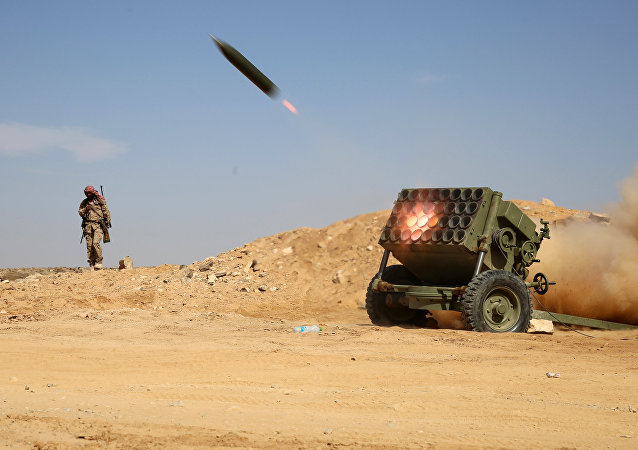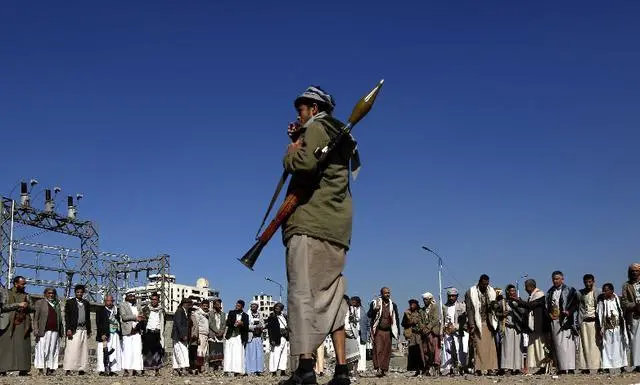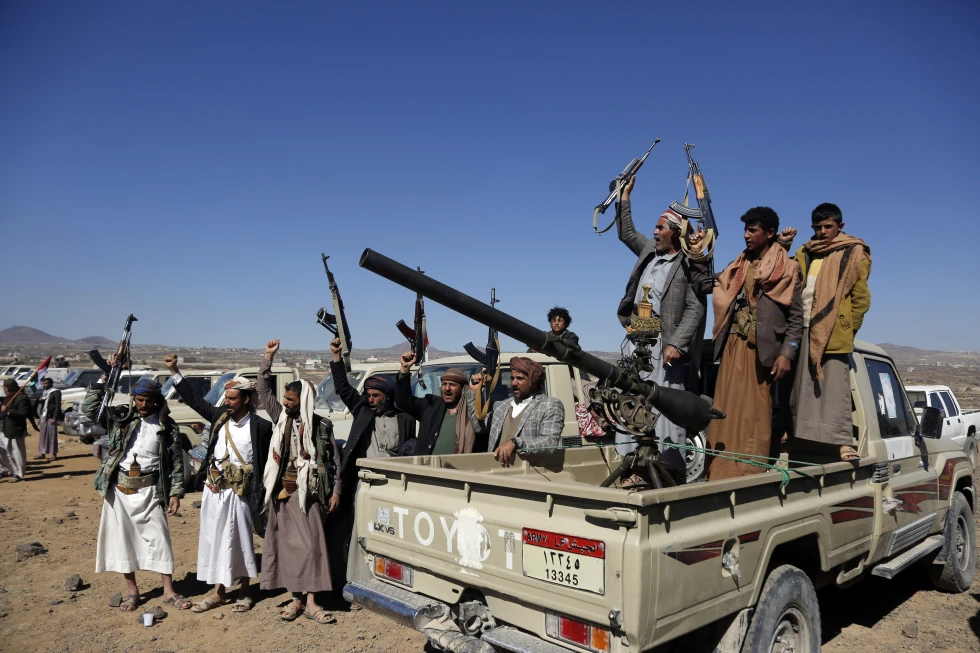The recent escalation of military action in the Middle East, specifically the U.S. military’s decision to conduct a series of ship- and submarine-launched missile strikes against Houthi-controlled sites in Yemen, has brought to the forefront a renewed focus on the ongoing conflict in the region.
This latest development, which represents the fourth instance in a matter of days that the U.S. has directly targeted the Houthi group, underscores the persistent volatility and complexity of the situation in the Middle East.
The spillover of violence following the Israel-Hamas war has contributed to a heightened sense of urgency and concern, prompting the U.S. to take decisive action in an effort to address the escalating tensions.
The strikes, reportedly launched from the Red Sea, were aimed at more than a dozen sites under Houthi control, according to multiple U.S. officials.
This deliberate and coordinated military response underscores the gravity of the situation and the determination of the U.S. to confront the destabilizing activities of the Houthi group.
Furthermore, the decision to place the Houthis back on the list of specially designated global terrorists has significant implications, as it signifies a renewed commitment to disrupt and dismantle the group’s networks and financing sources that enable their violent activities.
The announcement of these strikes and the re-designation of the Houthis as global terrorists have not only captured the attention of the international community but have also raised important questions about the broader implications of these actions.
The decision to target the Houthi-controlled sites reflects a strategic shift in U.S. policy towards the ongoing conflict in Yemen and the wider region.
It signals a clear intent to address the root causes of instability and violence, while also aiming to disrupt the financial networks that sustain extremist groups such as the Houthis.
The fact that these actions were carried out from the Red Sea further underscores the strategic significance of the region and the broader geopolitical considerations at play.
The Red Sea, a critical maritime corridor, holds strategic importance for global trade and security, and the use of this location for military operations highlights the broader implications and complexities of the situation.
Moreover, the decision to conduct these strikes from the Red Sea underscores the U.S.’s commitment to safeguarding vital maritime routes and ensuring regional stability in the face of escalating tensions.
The decision to speak on the condition of anonymity by the officials involved in the operations reflects the sensitivity and complexity of the situation.
It underscores the need for discretion and caution in discussing the details of these military operations, given the potential for broader repercussions and the delicate nature of international relations in the region.
This discretion also serves to underscore the seriousness of the U.S.’s approach to addressing the evolving security challenges in the Middle East.
The recent developments in the Middle East, particularly the U.S. military’s targeted strikes against Houthi-controlled sites and the re-designation of the group as global terrorists, have sparked a renewed debate about the broader implications and long-term consequences of these actions.
The decision to escalate military operations in response to the spillover of violence in the wake of the Israel-Hamas war underscores the interconnectedness of regional conflicts and the challenges they pose to international security and stability.
It also highlights the need for a comprehensive and multi-faceted approach to addressing the root causes of instability and violence in the region.
As the situation continues to evolve, it is imperative for the international community to closely monitor the developments in the Middle East and to engage in constructive dialogue aimed at de-escalating tensions and fostering a sustainable resolution to the ongoing conflicts.
The recent actions by the U.S. underscore the urgency of addressing the complex dynamics at play in the region and the need for a concerted effort to promote peace, stability, and security in the Middle East.
The ongoing conflict in Yemen has once again come to the forefront of international attention as Houthi-run al-Masirah TV reported on Telegram that recent strikes targeted several governorates in the country.
This news comes in the wake of a large-scale operation conducted by U.S. and British warships and warplanes, which resulted in the striking of over 60 targets across Yemen.
Despite these efforts, the Houthi rebels have continued their harassment campaign against commercial and military ships, with the most recent incident involving an attack drone launched from a Houthi-controlled area in Yemen, targeting the M/V Genco Picardy in the Gulf of Aden.
In response to these actions, the U.S. has issued strong warnings to Iran to cease providing weapons to the Houthi rebels.
This warning comes after a U.S. raid on a dhow intercepted ballistic missile parts that were allegedly being shipped to Yemen by Iran.
The situation escalated further when two U.S. Navy SEALs went missing during the seizure, with one being knocked off the vessel by a wave and the other following suit.
In light of these developments, Pentagon press secretary Maj. Gen. Pat Ryder has stated that the U.S. will continue to take military action to prevent further attacks.
It is evident that the situation in Yemen is complex and volatile, with various international actors becoming involved in an effort to address the ongoing conflict.
The conflict in Yemen has been ongoing for several years, and it has resulted in a humanitarian crisis of immense proportions.
The country has been plagued by violence, political instability, and a dire lack of basic necessities such as food, water, and medical supplies.
The involvement of external actors, such as the U.S. and Iran, has further complicated the situation and raised concerns about the potential for further escalation.
It is crucial for the international community to come together and work towards a peaceful resolution to the conflict in Yemen.
This will require diplomatic efforts, humanitarian aid, and a commitment to addressing the root causes of the conflict.

The suffering of the Yemeni people cannot be ignored, and it is imperative that all parties involved in the conflict prioritize the well-being of civilians above all else.
In conclusion, the recent developments in Yemen highlight the urgent need for a concerted international effort to address the conflict and alleviate the suffering of the Yemeni people.
The involvement of external actors and the escalation of military actions underscore the complexities of the situation and the potential for further destabilization.
It is imperative that all parties involved prioritize the pursuit of peace and work towards a sustainable solution that will bring an end to the violence and devastation in Yemen.
The recent events in the Gulf of Aden and the Red Sea have brought to light the ongoing threat posed by the Houthi rebels in Yemen.
The statement made by Ryder, a spokesperson for the U.S. military, highlights the seriousness of the situation and the need for continued vigilance in the region.
It is clear that the Houthi rebels are exploiting the current situation to conduct attacks against ships and vessels from more than 50 countries around the world.
This is a cause for concern not only for the safety of the ships and their crew, but also for the stability of global maritime trade.
The series of incidents that have occurred since the joint operations on Friday are deeply troubling. The fact that the Houthi rebels fired an anti-ship cruise missile at a U.S.
Navy destroyer is a clear indication of their willingness to engage in aggressive and provocative actions. The subsequent attacks on a U.S.-owned ship in the Gulf of Aden and a Malta-flagged bulk carrier in the Red Sea further demonstrate the extent of the threat posed by the Houthi rebels.
In response to these attacks, the U.S. military took decisive action to protect merchant and U.S. Navy ships in the region.
The striking of four anti-ship ballistic missiles that were prepared to launch is a clear signal that the U.S. is committed to deterring future attacks by the Houthi rebels.
It is imperative that the international community stands united in condemning these acts of aggression and in supporting efforts to prevent further attacks in the future.
The claim of responsibility by the Houthi rebels for the attack on the Malta-flagged bulk carrier Zografia is a stark reminder of the brazenness of their actions.
While it is fortunate that no one was injured in this particular incident, it serves as a wake-up call to the potential consequences of allowing the Houthi rebels to continue their campaign of aggression unchecked.
In light of these developments, it is clear that a coordinated and robust response is needed to address the threat posed by the Houthi rebels.

This response should involve not only military measures to deter and prevent further attacks, but also diplomatic efforts to address the root causes of the conflict in Yemen.
It is crucial that the international community works together to find a peaceful and sustainable solution to the crisis in Yemen, in order to prevent further destabilization of the region.
In conclusion, the recent attacks by the Houthi rebels in the Gulf of Aden and the Red Sea are a cause for serious concern.
The international community must remain vigilant and take decisive action to prevent further attacks and to address the underlying causes of the conflict in Yemen.
It is only through a united and concerted effort that we can hope to bring about a lasting peace and stability in the region.
